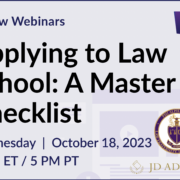Should I Retake the LSAT?
 Should I Retake the LSAT? Many LSAT takers, unhappy with their scores, wonder if they should retake the LSAT.
Should I Retake the LSAT? Many LSAT takers, unhappy with their scores, wonder if they should retake the LSAT.
The general rule is that a person cannot take the LSAT more than three times in a two year period (regardless of whether you cancel your scores or do not report them) but there are exceptions to this rule – a notable one being that if your prospective law school approves you retaking the test, you will be able to. However, assuming you do not yet fall into that category, retaking the LSAT is not frowned upon nearly as much now as it used to be ten years ago. UPDATE: THIS HAS CHANGED! You are now allowed to take the LSAT as many times as you want.
One reason for this is: There are no longer the same penalties for retaking the LSAT. Prior to 2006, LSAC would send an “average” of your LSAT score as well as each score separately (and schools were required to report this average score). This would mean that if you scored extremely low on one LSAT, even scoring extremely high on a later LSAT would only help you a little bit as your scores would be averaged together to create an overall score.
Post-2006, however, schools were only required to report the highest LSAT scores of students. So now, many law schools only consider your highest score when deciding to admit you! This is much better news for repeat takers as you are not penalized for a low LSAT score on your initial attempt.
Still, you do not want to go through the trouble of retaking the LSAT unless you really think it is worth it. Here are some questions to consider when you are deciding to retake the LSAT:
Should I retake the LSAT?
Here are some questions to ask yourself if you are wondering if you should retake the LSAT.
- When am I applying to law school? If you are going to take the February test for the same year you are applying, you will be at a disadvantage for all schools that allow rolling admissions. You have to ask yourself if a score increase is worth late application. However, if your “retake LSAT” will be prior to the year you are applying, this concern is diminished. (Read this post to see the advantages and disadvantages for taking the LSAT on particular test dates.)
- Did you prepare enough for the LSAT? If the answer is “no” then it is worth it to consider retaking it. If the answer is “yes, I did everything I possibly could!” then maybe retaking it will be less likely to result in a higher score. Truly consider whether you put the necessary time and practice in to achieve a high LSAT score.
- Was this LSAT score reflective of my ability? A lot of students do not improve when they retake the LSAT. But students who were sick, anxious, or not prepared sometimes see their scores improve dramatically. Ask yourself: Were you ill during the LSAT? Were you super-anxious? Did you not prepare enough? Or were you feeling fine and was your score in line with the scores you were achieving on practice tests? If you think you never truly figured out the logic games or the logical reasoning section, do you think a tutor would help you? Truly consider what went wrong (if anything) and what you could change if you decided to retake the LSAT.
- Is your LSAT score what schools are looking for? If your score is in the range that schools are looking for, then it might not be worth it to try to get it up a point or two. If, however, you are below the range then it is worth it to consider retaking the LSAT.
- Can I do anything else to improve my chances of being admitted to law school? If you still have plenty of time left in undergrad and your GPA is on the low side, working on improving your GPA or your overall application may be a better bet than working on improving your LSAT score, especially if you feel as though you prepared well for the LSAT.
- Can I do anything differently to truly change my score next time? Consider private tutoring for the LSAT if there were portions you didn’t every quite “get.” Or dedicate the time to studying for the LSAT — make sure to take several full, practice, timed LSATs prior to the exam. Cut down on work and other obligations. Our students who do all three of these things – private tutoring, full practice exams, and cutting down on other obligations – often see significant improvements in their LSAT scores.
Pursuing Law School? We’ve Got You Covered!
🌟 Special Offer: Enroll in our FREE on-demand law school prep course, meticulously crafted by a top-ranked law student. Secure your spot now





Comments are closed.